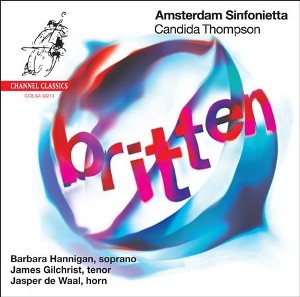Not surprisingly Benjamin Britten’s 100th birthday year has brought with it a number of new recordings—not that there weren’t plenty in the catalog already; for the past 60 or so years Britten’s music has received generous attention from performers and record companies, beginning with Britten’s own recordings on which he conducted or performed as pianist. In fact, Britten recorded a significant number of his works, and many of these remain the reference versions, although many excellent contenders have come along in the years since the composer’s death in 1976. This one takes a place among them.
All three works featured on this program, written during a span of six very important years in Britten’s career, are substantial, brimming with originality, impressive, especially for a young composer in his 20s, for the sheer mastery of craft and of subject—and in each of these cases, built on an instrumental ensemble platform for which Britten always had a special affinity: the string orchestra. The music spans the pre- and mid-war years (1937-43) that included the composer’s influential experiences in the U.S., the germination of that transforming masterwork, the opera Peter Grimes, and the solidifying of Britten’s unique musical voice and outlook.
And so this program makes an excellent impression as to the composer’s approach to the voice and to text, as well as his unique treatment of and uncommonly personal manner in his use of solo instruments—in the Serenade, had anyone ever conceived such a role for the horn before (or have they since)? The challenges in this solo part are well known to every hornist, and anyone who attempts this work follows in the formidable footsteps of Dennis Brain and Barry Tuckwell, both of whom recorded the work with Britten. Here, the very accomplished Jasper de Waal offers a worthy performance, although it could benefit from just a bit more personality, a little more suavity here or sensuality there, or more dramatic presence overall.
Any new performance of these works, whether one likes it or not, will be compared to Britten’s, and these from the Amsterdam Sinfonietta measure up quite well, in many cases making their own mark, most notably in the Bridge Variations, which benefit from a conductor and orchestra who go at this music with a big voice and a ferocity that suits the plus-size nature of the music while exalting the considerable, and in Britten’s hands, often surprising capabilities of a string orchestra. My only reservations—and they are not major ones—become apparent with a comparison. Britten was never better than in his treatments of funereal themes; he was great with death and darkness, the conflicting human forces of good and evil, the fall of innocence, the confrontation with and inevitability of mortality.
There are no better examples of this than in the Variations’ “Funeral March” or in the “Elegy” from the Serenade. In both cases, Britten’s renditions (with the English Chamber Orchestra in the Variations, and with Pears and Tuckwell in the Serenade) are absolutely electrifying—it wouldn’t be exaggerating to say hair-raising. Tuckwell’s horn in the Elegy sends chills up the spine, while de Waal and Candida Thompson’s Amsterdam players offer something closer to a more genteel haunting—effective in its way, and superbly played, but not the stuff of scary dreams, the desirability of which I acknowledge comes down to a matter of taste and expectation. In the Funeral March, Thompson begins powerfully, the repeated bass figure properly imposing, but then the whole thing relaxes somewhat, the mood still with a hint of menace, but not as convincingly so. It’s a different approach that works just fine, outside of comparison with the Britten performances. And, importantly, the orchestral playing here throughout is absolutely first rate, equal to the best on disc.
James Gilchrist is, as always, a very sensitive singer in-synch with his material. He does a fine job here, if not displaying the total ownership of the Serenade exhibited by Pears in his definitive performances. His slightly reserved, halting “Pastoral” doesn’t quite work for me, but it’s beautifully sung, and you can’t fault him for asserting an individual interpretation that is clearly and confidently apart from Pears and his frequent imitators. Pears’ interpretations are so dominant in this music that if you’re used to those it’s difficult to accept another voice and rendition; but if you’re looking for one, Gilchrist (or Philip Langridge, on Naxos) will suit very well.
As for the Illuminations, originally conceived for a soprano, but officially listed for “high voice” and string orchestra (Swiss soprano Sophie Wyss gave the world premiere in London in 1940; tenor Peter Pears gave the U.S. premiere in 1942), Barbara Hannigan delivers a stunning performance as good as any on disc—dynamic, dramatic, and technically beyond mortal criticism. Her performance—and the orchestra’s in the Illuminations and in the Bridge Variations—makes a strong recommendation for this program, especially compelling in Channel Classics’ vibrant, realistic sound. There’s a lot of very strong recorded competition for the works on this disc, but rather than simply add clutter to the mix, this release offers a thoughtfully programmed, first-rate choice for listeners looking for an introduction to Britten, or for collectors who desire a new alternative to the classic Britten/Pears documents (and their clones). Adding to the collector value of the recording is the inclusion of the song Now Sleeps the Crimson Petal, originally composed for, but ultimately omitted from, the Serenade.
































